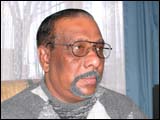Military intransigence, LTTE ban thwart direct talks
[TamilNet, Tuesday, 28 May 2002, 11:09 GMT]
(News Feature) The Sri Lankan military's continuing refusal to implement the terms and conditions of the 3-month old permanent ceasefire and the government's back-pedalling on the issue of deproscription of the Liberation Tigers is thwarting the holding of direct talks between the two sides, the Tamil Guardian newspaper quoted Mr. Anton Balasingham, the LTTE's chief negotiator and political advisor as saying Monday.
"Both we [LTTE] and the Sri Lankan government accepted in February that conditions of normalcy must be established in the Tamil areas through a process of de-escalation before direct talks are possible," Mr. Balasingham told the London-based newspaper from Switzerland where he had been meeting Swiss government officials and addressing the Tamil expatriate community.

"However, the Sri Lankan military has failed to meet mutually agreed deadlines for its withdrawal from schools, places of worship and public buildings in the Tamil areas. Furthermore, despite [government] assurances to the contrary, the army is continuing to occupy these locations," Mr.Balasingham said.
"The ceasefire and other goodwill measures on both sides are intended to build trust and confidence in the Norwegian peace initiative. However, the military's reneging on key aspects of the truce along with its aggressive posture has undermined the peace process," the LTTE's chief negotiator told
the Tamil Guardian.
The Norwegian facilitators acknowledged this week that direct talks are unlikely to take place as originally presumed, but played down the widening rift. Mr. Vidar Helgesen, Deputy Foreign Minister of Norway, said that the lack of an agreed agenda had delayed the negotiations.
"Time is clearly important but the most important thing is to agree on an agenda for talks," Helgesen told the Maharaja television station. "The aim is to bring the two parties to the table as soon as possible but if you rush it and bring them to the table with no clear agenda, I think that would be detrimental."
However, the issue of Sri Lanka's ban on the LTTE remains, posing a serious obstacle to direct talks. The LTTE says it will not negotiate as an outlawed movement, a stance strongly backed by Tamil political parties and public. Despite its earlier assurances that the ban will not prove an impediment to talks, the Sri Lankan government was backpedalling on the issue, Mr.Balasingham told the Tamil Guardian.
"We have consistently maintained that the LTTE cannot represent the Tamil people at negotiations whilst being banned. The Norwegian facilitators, with whom we have been working for many years now, have always been aware of this," he said.
"Furthermore, we had been assured that the new [United National Front] government would not let the ban hamper the peace process. However, the government is now going back on this position" Mr. Balasingham said.
Asked when he thought direct negotiations were likely to take place, Mr.Balasingham said: "It is impossible to draw up firm dates for talks when so many matters remain unresolved, including the unimplemented ceasefire and Sri Lanka's continuing ban on the LTTE."
"The Liberation Tigers are committed to the Norwegian peace process, but we are concerned at Sri Lanka's growing intransigence," he further said.
On Monday, a delegation led by Mr. Vidar Helgessen, Norway's Deputy Foreign Minister briefed Sri Lanka's President Chandrika Kumaratunga on their peace efforts. Mr. Lakshman Kadirgamar, former Foreign Minister under the People's Alliance government, and a vehement campaigner for the proscription of the LTTE, accompanied President Kumaratunga during the discussion held at the Presidential Secretariat.
"The President during the discussion had stressed that all the core issues relating to the future of the Northeast province should be included in the agenda for Thailand peace talks.," said in a press release issued by the Presidential Secretariat Monday evening.
"The President had reiterated her position that the question of setting up of an Interim Administration to the Northeast province should be discussed during peace talks in the context of core issues," the statement said.
"The Interim Administration should not be implemented until the core issues are finalised," the President had said, in direct contrast to the position hitherto adopted by the newly elected United National Front government of Prime Minister Ranil Wickremesinghe.









 "However, the Sri Lankan military has failed to meet mutually agreed deadlines for its withdrawal from schools, places of worship and public buildings in the Tamil areas. Furthermore, despite [government] assurances to the contrary, the army is continuing to occupy these locations," Mr.Balasingham said.
"However, the Sri Lankan military has failed to meet mutually agreed deadlines for its withdrawal from schools, places of worship and public buildings in the Tamil areas. Furthermore, despite [government] assurances to the contrary, the army is continuing to occupy these locations," Mr.Balasingham said.